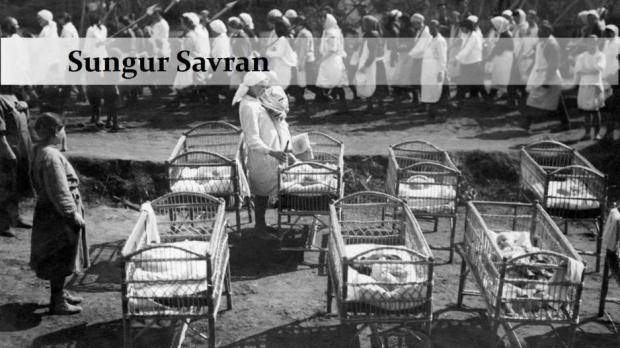
Is there anything more valuable to a worker than permanent job security? Can it be any better for workers when the malady of unemployment is overcome and replaced with a shortage of workers? Would society not cherish the workers, when there is a shortage of them? Do the workers not need for their families a robust education system, athletic facilities, and clubs raising world champions on every field and cheap books that reach every corner, every tiny village? What would an ageing worker want? Is it not a free, quality healthcare system relying on advanced medicine and a retirement system that lets them live without any fear for their future? How important is it for so-called “housewives” that do the hardest labour to have their burden taken away with daycares, collective laundry, and dining halls, as well as a right to retirement that lets them decide on their lives without financial dependence on their husbands?
The 20th century witnessed a state that provided all of these for the working class. It was called the Union of Soviet Socialist Republics. It was the fruit of the working-class revolution of October 1917 and was founded 100 years ago on December 30, 1922. The central executive power of this country was not in the hands of a parliament, but councils, or soviets as it is called in Russian, made up of elected representatives of workers, peasants, and soldiers who were toilers in uniform. It was these councils that nationalized all large-scale means of production and transportation, such as factories, dockyards, mines, railroads, sea trade, networks of large outlets and wholesale traders, and, of course, banks and all financial institutions, took them under state ownership. Once everything was in the state’s hands, it became possible to coordinate production at the same time, or in other words, to do central planning. This led to development at an unprecedented rate and a society that forgot unemployment. Indeed, the slogan that we use in Turkish became a reality: factories, banks to the state, the state to the workers!
Here, we can almost hear some workers telling us “but what is that to us, that was a Russian state”. Assume, for a moment, that this is the case, would it still not be necessary for workers all over the world to learn from the achievements of this state called Union of Soviet Socialist Republics (USSR, for short) for its working class?
But we said “assume”. Because this state was not a Russian state. It was simultaneously the state of other peoples, including Muslims and Turkic peoples. Azerbaijani, Uzbek, Turkmen, Kyrgyz, Tajik, Kazakh, Tatar, Kalmyk and Dagestani peoples as well as the remaining Circassian people (after their mass exile in the 19th century) are among the countless examples. They, too, benefitted from the achievements of the workers’ state, just as well as the Russians and other Christian and Jewish peoples of the country, over the 75 years. Azerbaijani workers had job security, Uzbeks lived without the fear of unemployment, Kazakhs had their kids get free and quality education, Turkmen elders was not suffering in long queues when they got sick.
Does the name of this state have any reference to “Russia”? No! Why not? Do you know of any other state that does not have any reference to a nationality or geography? Take a moment.
Of course not. Why? Because Lenin, as the greatest political leader of the working class in the 20th century, was the leader of this country and he founded it not for a specific nation but for the proletariat of all nations, that is for the international working class!
Muslim and Turkic peoples benefited immensely from this state. They quickly modernized their relatively backward economic structures in this way. Due to the policies of Lenin, who very explicitly upheld them as principles, they were able to develop their languages, cultures, education systems, and even the administration of local affairs. They rejoiced together with the successes of the USSR (never forget, it was the USSR that sent the first animal and the first person to space, not the USA!). Working classes do not have to belong to the same nation or religion to unite as one. This is how they secularized their societies in the proletarian sense. In no other Muslim-majority society, even in Turkey which used to boast of its secularity but lost a lot of ground lately, was the principle of secularism internalized in the consciousness of the masses to this degree.
USSR dissolved in 1991 as a result of a series of unfortunate developments. We belong to a political tradition, Revolutionary Marxism, that foresaw the degenerating effects of the bureaucratization of the USSR, and warned that bureaucratization deviated USSR’s movement towards socialism and might even result in the return of capitalism. Our analyses, both before and after the dissolution of the USSR, are out in the open for everyone to see. But we will not prolong this article with this any further. The essential cause of the dissolution was the difficulty of surviving as a socialist country in a world where most of the riches and technology were in the hands of rich capitalist countries.
Yet today, capitalism is leading the world to such misery and catastrophe that socialism is back on the agenda of the working class. The victory of socialism will be possible only with the political independence of the working class from the bourgeoisie. What should follow is a state without any national or geographical reference in its name, a state that will expand, uniting all workers of the world. The working class of Turkey, for its part, should take part in such a federation where everyone will maintain their language, culture, education, and local and regional administration, where all nations will live freely and fraternally. The most beautiful state of the working class is not a relic of the past, it will be the most beautiful state in the future!
